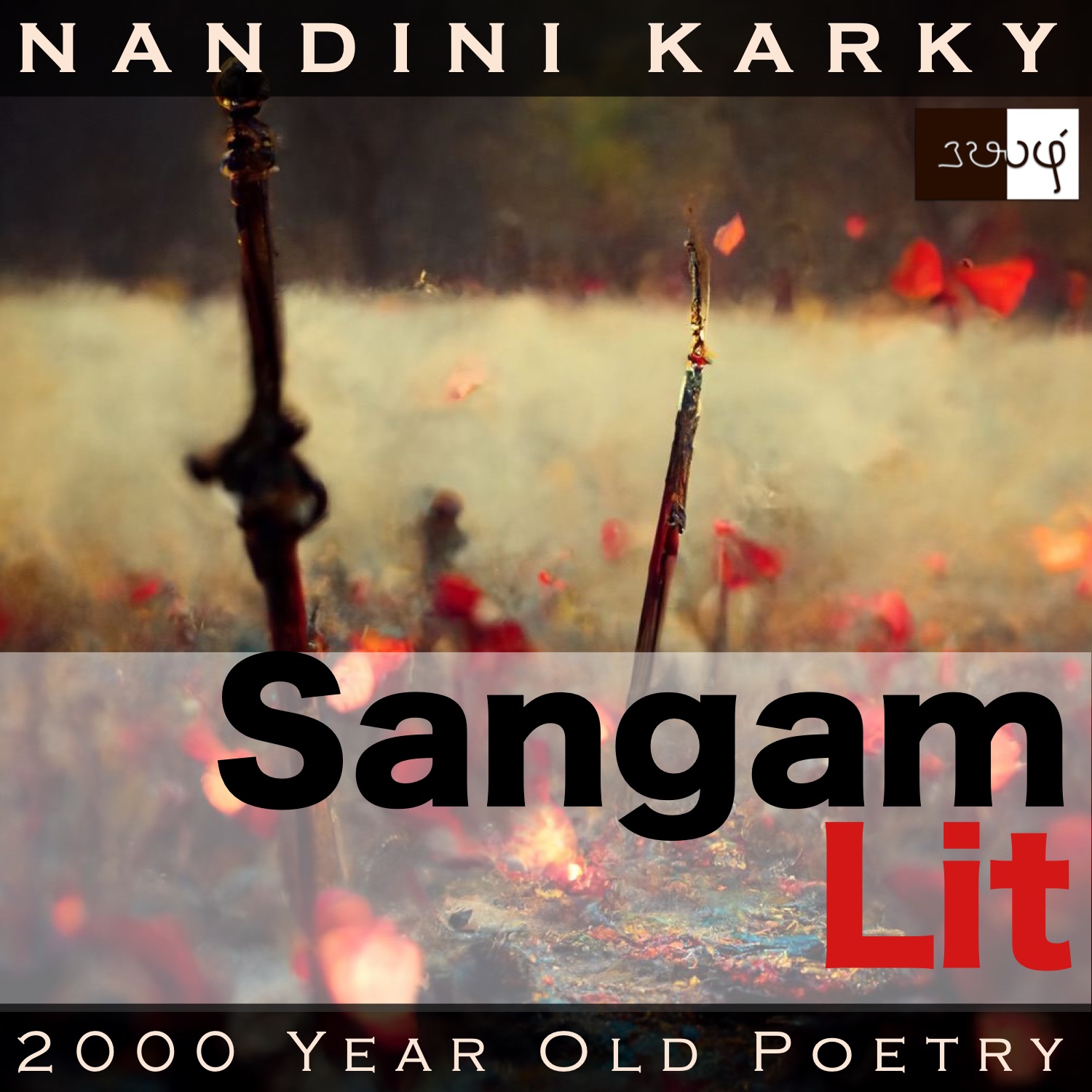Podcast: Play in new window | Download
Subscribe: Apple Podcasts | Spotify | Amazon Music | Android | iHeartRadio | Email | TuneIn | RSS | More

In this episode, we listen to the exploits of a king on a battlefield, as portrayed in Sangam Literary work, Puranaanooru 19, penned about the Pandya king Thalaiyaalankaanathu Cheruvendra Nedunchezhiyan by the poet Kudapulaviyanaar. The verse is situated in the category of ‘Vaagai Thinai’ or ‘a king’s victory’ and speaks of how the king won over seven rival rulers at a famous battle in Tamil history.
இமிழ் கடல் வளைஇய ஈண்டு அகன் கிடக்கை,
தமிழ் தலைமயங்கிய தலையாலங்கானத்து,
மன் உயிர்ப் பன்மையும், கூற்றத்து ஒருமையும்,
நின்னொடு தூக்கிய வென் வேல் செழிய!
‘இரும் புலி வேட்டுவன் பொறி அறிந்து மாட்டிய
பெருங் கல் அடாரும் போன்ம்’ என விரும்பி,
முயங்கினேன் அல்லனோ யானே மயங்கிக்
குன்றத்து இறுத்த குரீஇ இனம் போல,
அம்பு சென்று இறுத்த அரும் புண் யானைத்
தூம்புடைத் தடக் கை வாயொடு துமிந்து,
நாஞ்சில் ஒப்ப, நிலம் மிசைப் புரள,
எறிந்து களம் படுத்த ஏந்து வாள் வலத்தர்
‘எந்தையொடு கிடந்தோர், எம் புன் தலைப் புதல்வர்;
இன்ன விறலும் உளகொல், நமக்கு?’ என,
மூதில் பெண்டிர் கசிந்து அழ, நாணி,
கூற்றுக் கண்ணோடிய வெருவரு பறந்தலை,
எழுவர் நல் வலம் கடந்தோய்! நின்
கழூஉ விளங்கு ஆரம் கவைஇய மார்பே?
Of the 800 plus songs explored thus far, this is the first time the word ‘தமிழ்’ denoting both the language and people of the southernmost region of India appears. Felt happy to see that one of my identities, that of being a Tamil, is exactly how the people of this region saw themselves two thousand years ago. Moving on to the patron king, Pandyan Nedunchezhiyan, being described herein, we have briefly touched upon this king and this war at Thalaiyaalankaanam in the two preceding poems of Puranaanooru 17 and 18. Now, let’s listen to what this poet has to say about this much celebrated king through this translation:
“Upon this wide land, surrounded by resounding seas, the Tamils battled at Thalaiyaalankaanam. There, you demonstrated the multiplicity of lives and the singularity of death, O Chezhiyan with a victorious spear!
‘Akin to the well-laid trap placed in the mountain by hunters of the huge tiger, is his wide chest’ I thought as I embraced it with affection.
Akin to the confused flock of birds that rest upon small hills, arrows pierce elephants, leaving them with unbearable wounds. And then they sever the elephant’s hollow trunk at the mouth, which falls on the land and looks like a plough.
Thrown about and lying on the battlefield are brave men with raised swords. Crying ‘along with our husbands, here lie our sparse-haired sons too’, women from warrior clans ask aloud ‘what other victory could there be for us?’ and shed copious tears. Seeing this, even death feels ashamed on that fearsome battlefield. And it is here, you conquered the seven!
And that’s why I thought about the tiger trap, as I embraced your clean, radiant, pearl-clad chest!”
Time to delve into the details of this somewhat disturbing song! The poet starts by talking generically about this land surrounded by roaring seas and then zooms to the seat of action, a place called Thalaiyaalankaanam, where he says the Tamils were at war with each other. He then turns to the king and says that’s where the king showed that lives may be many, many but death that strikes them all is but one. A philosophical thought that death spares no one, no matter who they are, where they are, in this world!
Then, the poet goes on to describe what thoughts coursed through his mind as he embraced the radiant chest of this king. He was reminded of the huge wooden trap, with which hunters cage a tiger in the caves of a mountain. Apparently, these hunters would leave some bleating sheep inside the caves and once the tiger enters, pulled by the sheep’s scent and sound, these hunters would close the mouth of the cave with a wide wooden board so that the tiger cannot escape. That wide board that can cage even fierce tigers, the poet places in parallel to the king’s chest.
The poet follows this with the reason why he chose this terrifying simile for the king’s feature by narrating the scenes of the battle at Thalaiyaalankaanam. Here, arrows pierce the skin of elephants and look like sparrows resting atop hills. After this, the poet narrates an action that made me feel a little sickened. He talks of how the trunks of these fallen enemy elephants are severed and they seem to lie on the ground akin to farmland ploughs. I shudder at the pain inflicted on these innocent animals, made to fight a pointless war for the sake of humans!
If that’s the case of animals on that battle field, the humans did not fare any better, for they too lay there dead, making the women of warrior clans cry aloud, lamenting the death of their husbands and young sons. Seeing this, even the God of Death felt ashamed, the poet remarks, concluding with the words that it was on such a battlefield that the Pandya king won over seven rulers – the Chera, Chozha kings, and five other chieftains or ‘Velirs’.
Victory is fine and great but at what cost? The plight of humans and animals in that battlefield sends shivers down the spine even after these thousands of years, and yet, wars do go on. Won’t our descendants a thousand years later look back at our time and shudder at the thoughtless wars fought with technology today? Indeed, food for thought for those in the seats of power!




Share your thoughts...